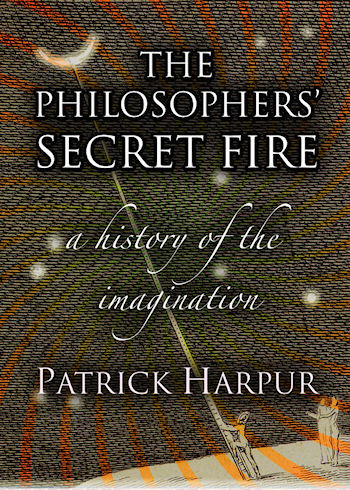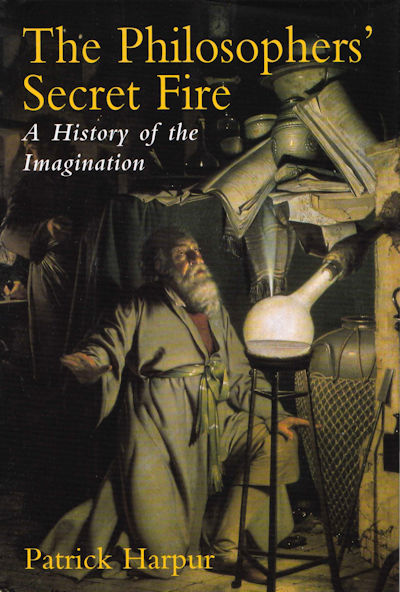

The Philosophers' Secret Fire: A History of the Imagination
First published by Penguin in 2002, and in the US by Ivan R. Dee in 2004.
In the UK by Squeeze Press 2009
Is there any place for the ancient myths of our ancestors in modern times? Could their shadowy presence in our common imagination be more influential than we realize?
Across the globe many societies still believe in an Otherworld of spirits, gods and daimons, which the West has banished to the unconscious mind and now only visits in dreams. Yet this visionary tradition continues to subvert the rational universe, erupting out of the shadows in times of intense religious and philosophical transition.
In his dazzling history of the imagination, Patrick Harpur links together fields as far apart as Greek philosophy and depth psychology, Renaissance magic and tribal ritual, Romantic poetry and the ecstasy of the shaman, to trace how myths have been used to make sense of the world. He uncovers that tradition which alchemists imagined as a Golden Chain of initiates, who passed their mysterious 'secret fire' down through the ages.
As this inspiring book shows, the secret of this perennial wisdom is of an imaginative insight: a simple way of seeing that re-enchants our existence and restores us to our own true selves.
From RESURGENCE:
The Oonark Eskimos were unimpressed by man's lunar landing. 'That's nothing', said one. 'My uncle went to the moon lots of times.' But in a culture as hostile as ours to the wisdom of vision and enchantment, the authenticity of such metaphorical experience has been denied. With matter defined as the only reality, things as 'immaterial' as the soul, imagination, or less visible worlds are deemed to have no substance and therefore not to matter: even as I write, Professor Stephen Hawking is on air declaring belief in God to be infantile.
In this context, Patrick Harpur's brilliant new study of the imagination - impassioned, wise, wry, humane, full of dynamic scholarship and inspired argument - is especially welcome. A fascinating, beautifully written history, not only is it intellectually meaty, overflowing with telling insight and detailed example, but on a heart level it reminds us of the deeply healing effects of a more generous and imaginal way of seeing. I found myself reviewing my own life in a new way: decisions driven by promptings from intuitions or dreams no longer seemed crazy, but full of divinest sense; I was left vindicated and reassured, with a renewed trust in the unconscious. The problem is less one of ignorance than amnesia. In our forgetting of a larger, more sacred vision, our literalism - taking this too solid world as the only truth - has become a kind of curse. For the ancient Greeks, truth was aletheia - 'not forgetting' - and learning less an act of cognition than of recognition: a process of remembering.
Harpur's powerful chronicle of this eclipsed tradition of otherworldly beings - angels, devils, gods, the Irish sidhe, the whole prolific realm once known as 'faery' - helps us remember a way of inhabiting the world that is more ambiguous and shape-shifting than the dull secularism which has come to prevail these last three centuries. His 'daimonic' reality - close to Jung's 'psychic' and Hillman's 'imaginal' - invokes a world that is inner as much as outer, where the imagination may not come from us so much as contain us: 'It's as likely that gods imagine us as that we imagine them.' He undermines dogmatic atheism and the arrogance of any human-centred universe which assumes God to be our invention rather than vice versa. And the reductive literalism we inhabit - our culture's negative default button - becomes little more than another fiction, another myth, hell-bent on denying the soul. 'The sin of the ego is to wish to sever itself from its own source; its tragedy is that it sometimes succeeds.'
Some of the contours of his map of the imagination are familiar - the ideas of Heraclitus, Plotinus and Plato; Coleridge, Eliot and Hughes; Boehme, Blake and Yeats; Jung and Hillman - and the notion that from the early 17th century, the falling away of an imaginal reality has gathered momentum. In the process of our increased materialism of value and thought, we have lost vital touch with the anima mundi - the soul of the world - that collective energy which manifests both spiritually and physically and whose neglect has led to our current lack of meaning and beauty. Banished and suppressed, however, otherworldly realities do not die but return in more disturbing form - the daimonic turns into the demonic - what Yeats called those 'lethargies and cruelties and timidities' whose roots lie in a denial of imagination.
But as he traces the mercurial shifts of a neo-Platonic tradition through the centuries, expertly weaving together Norse and Greek myth, Renaissance magi and alchemists, ancient and modern theorists of dream and the unconscious, Harpur does something new. Part of his genius lies in the rich, non-linear way he re-tells the imagination's history, part in the originality of his contemporary insights. At every turn he draws out the pertinence of a particular idea for our times, re-reading our literal culture in a symbolic way. The World Wide Web becomes an unconscious imitation of the anima mundi, Mediterranean holidays under a scorching sun turn into rituals of initiation, tourism a 'secular pilgrimage', Western medicine an echo of the mysteries of the alchemists, Derrida and post-structuralism a debased version of Kabbalism, anorexia a hunger for meaningful entry into society - all inverted attempts to invent ritual that is otherwise lacking.
Nor is this simply a book about the imagination: for all his profound and impressive scholarship, Harpur effectively thinks in images. The texture is almost filmic in the movement from scene to imagined scene: Petrarch's manifesto of the daimonic nature of man after a vision on the summit of Mount Ventoux in 1336; Edward Kelley and John Dee gathering with alchemists in Prague in 1583; or the fatal beginnings of the modern outlawing of the imagination in 1623 when one Marin Mersenne, described by James Hillman as 'the vegan spider dressed in black from head to foot', condemns Ficino, Pico, the magic of hermeticism and the anima mundi. Amongst the most graphic is the portrait of Charles Darwin, 'doubled up, trembling, vomiting, and dowsing himself in icy water'. Darwin's recoil from the profusion of the natural world - nauseous at 'the sight of a feather in a peacock's tail' - leads Harpur into the most incisive yet concise critique of Darwinism I have ever seen, all the more powerful for being focused, as dreams are, around an image. ('Image is psyche', said Jung.)
It would be hard to overestimate the value of Harpur's book or to praise it too highly. Packed with fabulous detail at which I can only hint at here, it convinces us once again that everything is soul. We're offered a timely reminder to recall our larger mystical selves, to conceive of possibilities of transformation, to remove the constraints from our limited notion of reality and celebrate life's infinite and sacred inventiveness.
And without this restoration, how can we move forwards? It is the ability to imagine ourselves in the place of another which is the essential movement behind love: if the imagination is atrophied, so is the heart. A world which fails to foster the imagination fails to foster compassion - and the lethal consequences of that we know only too well.
~~~
From THE GUARDIAN:
Billed as a history of the imagination, this is more accurately a history of the core metaphors of western thought, with respect for the central myths of other societies.... It is at its most revelatory when it connects ancient imagery for the invisible otherworld with scientific names for the same thing - Hades and Black Holes.... A sublime read.
~~~
From THE INDEPENDENT ON SUNDAY:
Once we believed that truth was 'out there', now we hold that it's 'in here', but if Harpur is right then it lies in the line of vision between the two.... In his casual brilliance he evokes the boldness of the stallion in the book of Job, who hears the crying of the captains, and is not afraid....
~~~
From THE LONDON MAGAZINE:
One of the many things I admire about this timely book is the engaging way it offers something to upset just about everybody. And how should it be otherwise when it is the author's considered intention to explode the peculiar perspective on which the prevailing forces of modern consciousness rely?.... If you're a hard-nosed materialist with little time for a countervailing vision of the mythical realities we inhabit , then all the more reason to read this book, for Harpur is a serious man with some serious questions to put to you. It's our good fortune that he also has a counter-inflationary sense of humour and knows just how slippery his daimonic view of things can be.... For some time now Harpur has performed his role as emissary of Hermes with such elusive loyalty that I sometimes wonder whether he exists at all. Such traces as are to be found suggest that he simply manifests among us every now and then as a salutary, epiphenomenal response to our urgent need for his eloquent brand of imaginative insight.... And it's not just what the book has to say but the quicksilver way it says it, for there's something suitably daimonic about Harpur's prose. It has a now-you-see-it-now-you-don't quality in the fine old alchemical tradition that leaves you feeling richer rather than ripped-off - so long as you're willing to bring an open-hearted imagination to bear on its operations.... His flame-like knowledge is central to the urgent seriousness of this book.